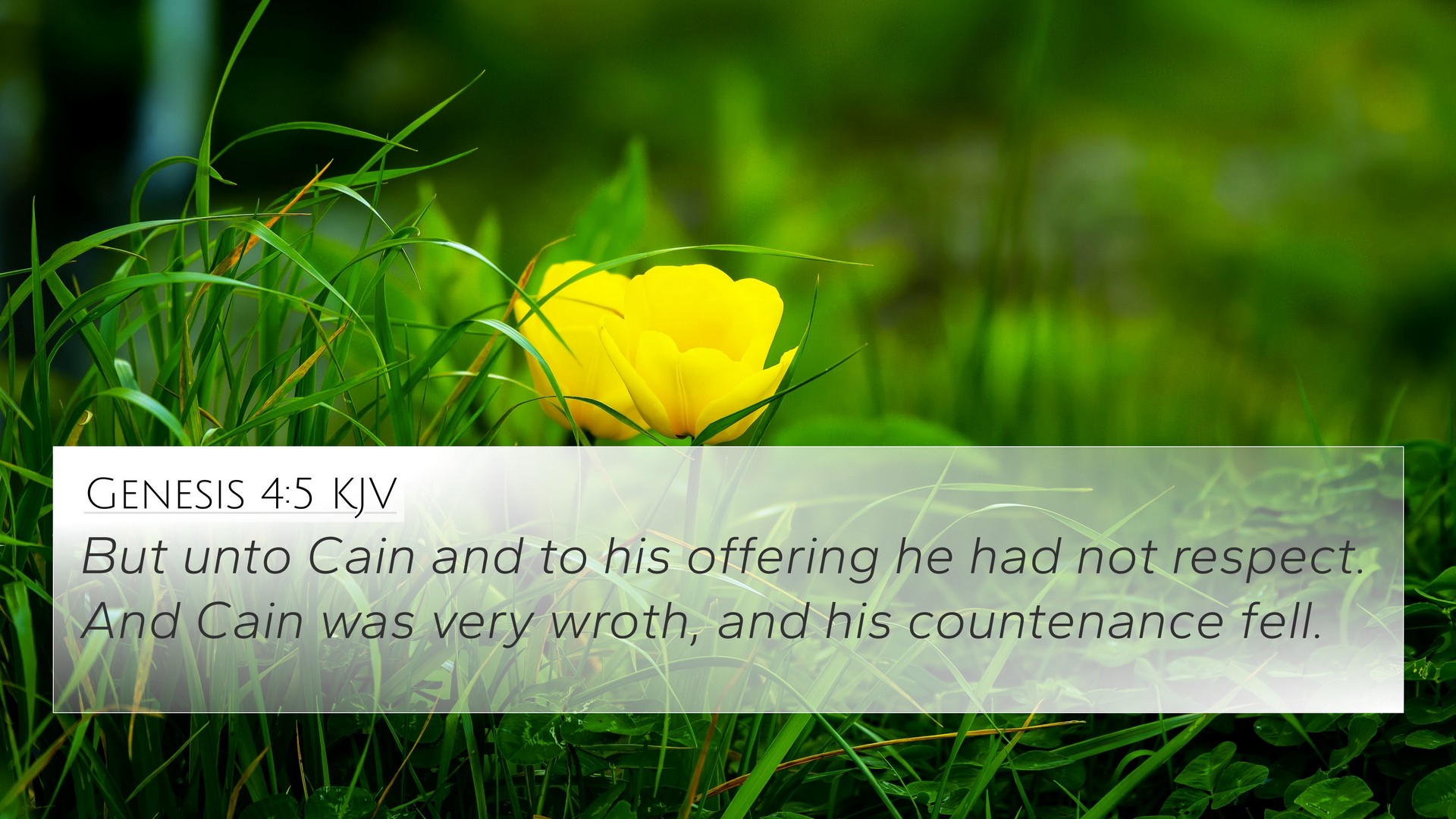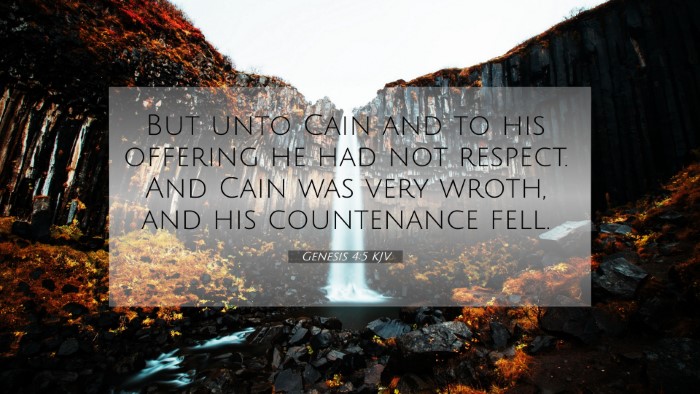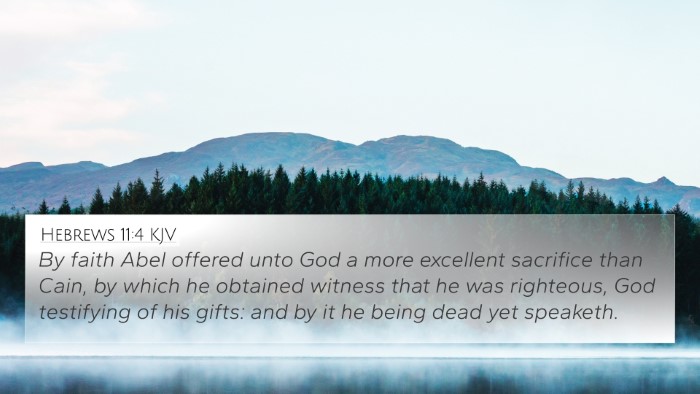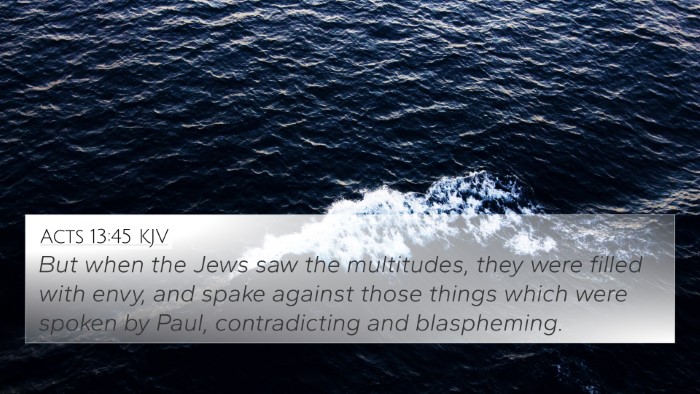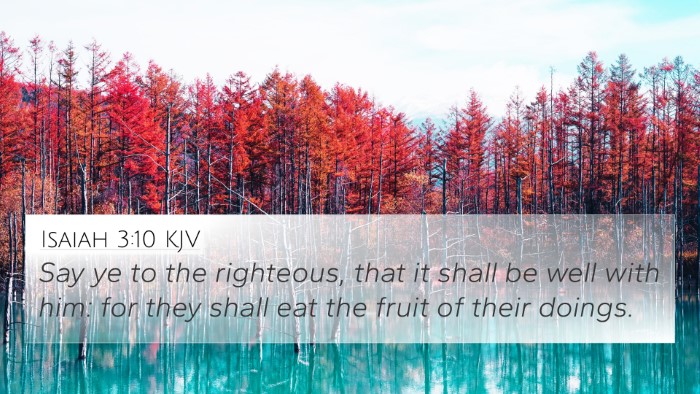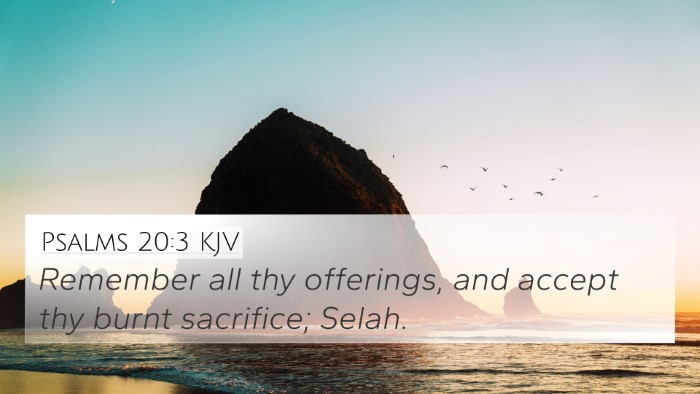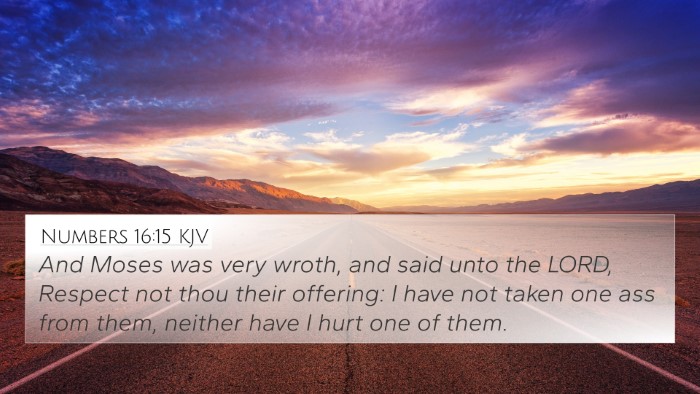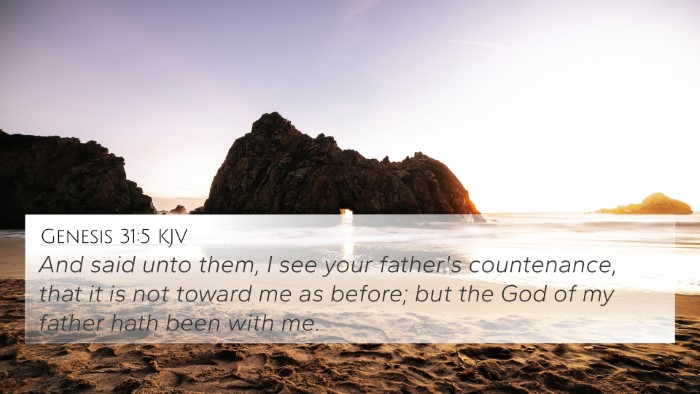Understanding Genesis 4:5
Genesis 4:5 states, "But unto Cain and to his offering he had not respect. And Cain was very wroth, and his countenance fell." This verse plays a crucial role in the narrative of Cain and Abel, illustrating themes of acceptance, divine favor, and emotional response to rejection. Below is a detailed interpretation based on public domain commentaries from respected theologians like Matthew Henry, Albert Barnes, and Adam Clarke.
Commentary Insights
Matthew Henry’s Commentary provides a comprehensive evaluation of Cain's reaction to God's disregard for his offering:
- Divine Order: Henry points out that God established a system of worship that includes proper intentions and heart alignment with offerings.
- The Nature of Anger: The intense anger of Cain signifies not only his displeasure at God's rejection but also a deeper commentary on human emotions when faced with divine standards.
- Spiritual Consequences: Henry notes that Cain’s response leads him down a path of sin, illustrating the broader biblical theme of how anger can entrap an individual.
Albert Barnes’ Notes on the Bible also emphasize Cain's emotional state:
- Acceptance and Rejection: Barnes explains that the distinction between Abel's and Cain's offerings was based on faith; Abel's was accepted for its sincerity, while Cain's was not.
- Sowing Discord: The commentary emphasizes how anger can lead to jealousy and hate, which is crucial for understanding Cain's subsequent actions.
- Cultural Interpretations: Barnes highlights how various cultural contexts view the significance of offerings and respect from God.
Adam Clarke’s Commentary adds another layer of spiritual significance:
- Symbolism of Offerings: Clarke interprets the offerings as representations of the heart; Cain’s offering was not accompanied by the right attitude, demonstrating a relationship with God based on rituals rather than genuine faith.
- Emotional Implications: Clarke examines the psychological dimensions of Cain’s wrath, connecting it with themes of pride, self-worth, and offense.
- Divine Interaction: Clarke suggests that God’s rejection was an opportunity for Cain to reflect and rectify his heart, thus indicating that God's communication was not punitive but corrective.
Cross References
This verse is related to several other scriptures that expand on its themes. Here are some notable cross-references:
- Hebrews 11:4: "By faith Abel offered to God a more acceptable sacrifice than Cain." This passage contrasts the faith behind the offerings.
- 1 John 3:12: "We should not be like Cain, who was of the evil one and murdered his brother." This verse addresses the moral implications of Cain's anger.
- Genesis 4:6-7: God's inquiry to Cain about his anger, demonstrating divine patience and a call to self-reflection.
- Matthew 5:22: "But I say to you that everyone who is angry with his brother will be liable to judgment." This illustrates the New Testament expansion on the themes of anger and morality.
- Proverbs 14:30: "A tranquil heart gives life to the flesh, but envy makes the bones rot." This speaks to the destructive nature of anger and jealousy.
- Romans 12:19: "Beloved, never avenge yourselves, but leave it to the wrath of God." This reinforces the idea of responding to hurt and anger with righteousness.
- James 1:20: "For the anger of man does not produce the righteousness of God." A practical admonition related to the nature of human anger.
Connecting Themes
Genesis 4:5 serves as a pivotal verse when considering the connections between Bible verses. The thematic explorations triggered by Cain's emotions underscore:
- Faith vs. Works: Understanding how offerings are an act of faith, as seen in Hebrews.
- The Nature of True Worship: Examining the heart condition that God desires in worship, seen throughout the Scriptures.
- Consequences of Sin: The trajectory from anger to action, demonstrated in the lives of many biblical characters, including Judas and David.
Utilizing Cross-References for Deeper Understanding
For those looking to delve deeper into this verse, employing a Bible cross-reference guide can greatly enhance your understanding. Here are several tools and methods that may prove beneficial:
- Bible Concordance: A resource to find verses related to specific words or themes within the text.
- Cross-Reference Systems: Using systems available in many study Bibles that directly link verses by theme.
- Comparative Studies: Investigating similarities between different passages that discuss similar themes, like the nature of worship or human emotions.
- Interactive Bible Studies: Participate in group studies that explore cross-referencing Bible texts to uncover deeper meanings.
Conclusion
Genesis 4:5 provides an essential exploration of human emotions and divine expectations in worship. By understanding the intricacies of Cain's response and its implications, one can engage in a thoughtful dialogue concerning faith, anger, and their consequences.
This commentary, enriched by comparative Bible verse analysis, demonstrates that exploring connections between Bible verses often reveals profound truths relevant to our spiritual walks today.
